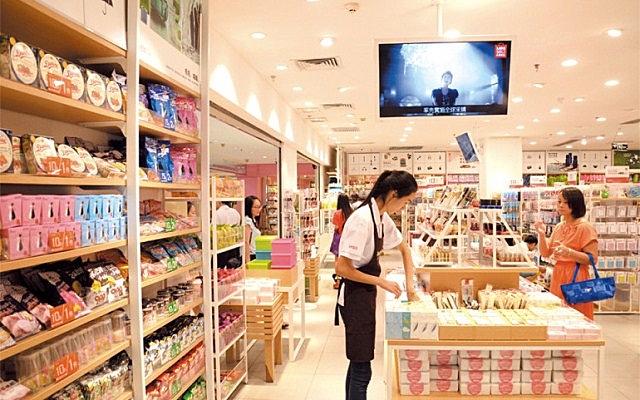Mumuso and Miniso under scrutiny
 |
| Mumuso and Miniso under scrutiny |
Trinh Anh Tuan, deputy director of the Ministry of Industry and Trade’s (MoIT) Competition and Consumer Protection Department, told VIR that the department is carrying out inspections on other firms with evidence of similar violations, including Miniso and Yoyosho. The fines placed on these firms will soon be officially announced if their violations are found.
“Mumuso is the first case to suffer the inspection. In line with recent reflections in the press, we intend to carry out thorough inspections and handle these violations,” Tuan added.
Mumuso Vietnam will be handled in accordance with Decree No.185/2013/ND-CP, stipulating the fines for administrative violations for producing and trading in fake goods, as well as in accordance with Decree No.71/2014/ND-CP, stipulating the sanctions on violations of the Law on Competition, according to Tuan.
According to Decree 185, Mumuso Vietnam is set to face a maximum administrative fine of VND100 million ($4,440). The fine was however said to be too small compared to Mumuso’s violations and not high enough to threaten the firm.
Mumuso Vietnam was licensed on October 25, 2016 in Tan Binh district, Ho Chi Minh City. On May 25, 2018, the company moved its headquarters to the city’s District 3. It is represented by Nham Phi Khanh with the charter capital of VND1 billion ($44,000). Nearly one week after the MoIT announced the report’s findings, and despite VIR’s repeated attempts to contact the firm, Mumuso Vietnam has given no official response.
Meanwhile, a representative of Miniso Vietnam, a China-based firm with similar business, told VIR that the company will readily co-operate with the MoIT if the ministry carries out an inspection into its practices.
“Miniso will readily adopt the MoIT’s advice and guidance in order to improve the related issues,” Miniso’s representative stated.
Similar to Mumuso, Miniso is a store chain specialising in household and consumer goods such as cosmetics, stationery, toys, and kitchenware. Despite previously describing itself as a Japanese retailer giant, Miniso has only four stores in Japan but a total of 1,100 stores in China.
These firms, taking advantage of people’s interest in South Korean and Japanese goods, have expanded rapidly within Vietnam. Two years after entering the Vietnamese market, Mumuso has 32 stores and 200,000 loyal customers, and Miniso has 34 stores across the country, according to their websites.
Miniso’s global revenue also skyrocketed from $770 million in 2015 to $1.8 billion in 2017. Despite no information about the revenue streams of Mumuso and Miniso within Vietnam, it is apparent that both companies are thriving in this market. Mumuso’s rapid pace has led it to open four stores within one month, with the intention of opening 80 stores by late 2018 and 200 stores by 2019. Miniso’s plans are to open 50 stores by the end of this year and 400 stores by 2022.
On July 12, the MoIT announced the results of its inspection into Mumuso Vietnam in terms of how the company complied with the laws of Vietnam between early 2016 through May 31, 2018. 2,257 out of Mumuso’s 2,273 goods were found to be imported from China, with the rest being bought from domestic suppliers. The report’s findings stated that Mumuso Vietnam had shown signs of violating the laws on consumer protection by providing insufficient information related to its products’ origins. While the information on its products refers to South Korea, there are no legal documents to prove they were produced in South Korea.
Furthermore, Mumuso’s introduction of “We come from Korea” and using the Korean language on its products’ packages indicates that Mumuso has violated the Law on Competition, specifically through using advertisement inferring a South Korean origin to its products in order to gain an unfair edge over its competitors.
More than two months after the sales of Chinese goods under South Korean and Japanese brands was first disputed, many domestic consumers have shown their disappointment with Mumuso and Miniso on social networks and many said they would stop buying their products.
In the case of consumers suffering damages due to buying Mumuso and Miniso goods, an official of the Vietnam Standard and Consumer Association who wished to remain unnamed told VIR, “If there is enough evidence to prove the firm purposely cheated them, consumers are entitled to lodge complaints with the Vietnam Competition Authority and higher levels to deal with the problem.”
In March 2018, the Ho Chi Minh City People’s Committee also placed a fine of VND322 million ($14,185) on Mumuso Vietnam due to the company conducting business in illegally imported goods, including illegal cosmetic goods. This was in accordance with Decree No.176/2013/ND-CP, stipulating the imposition on administrative offences in cosmetic, drug, and medical equipment segments, as well as with Decree 185.
What the stars mean:
★ Poor ★ ★ Promising ★★★ Good ★★★★ Very good ★★★★★ Exceptional
 Tag:
Tag:
Related Contents
Latest News
More News
- Masan Consumer names new deputy CEO to drive foods and beverages growth (February 23, 2026 | 20:52)
- Myriad risks ahead, but ones Vietnam can confront (February 20, 2026 | 15:02)
- Vietnam making the leap into AI and semiconductors (February 20, 2026 | 09:37)
- Funding must be activated for semiconductor success (February 20, 2026 | 09:20)
- Resilience as new benchmark for smarter infrastructure (February 19, 2026 | 20:35)
- A golden time to shine within ASEAN (February 19, 2026 | 20:22)
- Vietnam’s pivotal year for advancing sustainability (February 19, 2026 | 08:44)
- Strengthening the core role of industry and trade (February 19, 2026 | 08:35)
- Future orientations for healthcare improvements (February 19, 2026 | 08:29)
- Infrastructure orientations suitable for a new chapter (February 19, 2026 | 08:15)






















 Mobile Version
Mobile Version